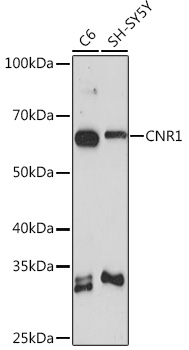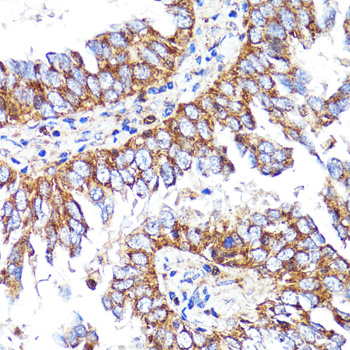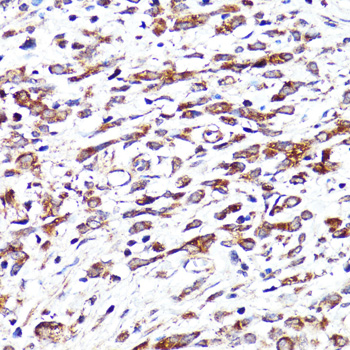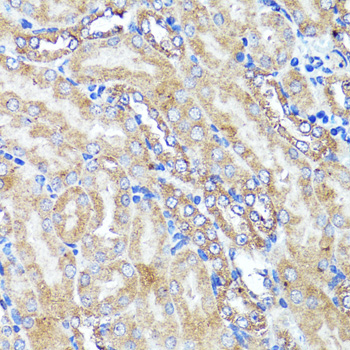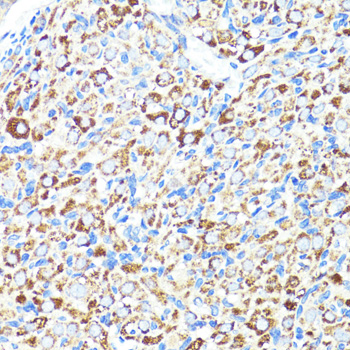Anti-CNR1 Antibody (CAB1447)
- SKU:
- CAB1447
- Product type:
- Antibody
- Reactivity:
- Human
- Reactivity:
- Mouse
- Reactivity:
- Rat
- Host Species:
- Rabbit
- Isotype:
- IgG
- Antibody Type:
- Polyclonal Antibody
- Research Area:
- Cell Biology
Description
| 抗体名: | Anti-CNR1 Antibody |
| 抗体コード: | CAB1447 |
| 抗体サイズ: | 20uL, 50uL, 100uL |
| 申し込み: | WB IHC |
| 反応性: | Human, Mouse, Rat |
| 宿主種: | Rabbit |
| 免疫原: | Recombinant fusion protein containing a sequence corresponding to amino acids 1-120 of human CNR1 (NP_001153731.1). |
| 申し込み: | WB IHC |
| 推奨希釈: | WB 1:500 - 1:2000 IHC 1:50 - 1:100 |
| 反応性: | Human, Mouse, Rat |
| ポジティブサンプル: | C6, SH-SY5Y |
| 免疫原: | Recombinant fusion protein containing a sequence corresponding to amino acids 1-120 of human CNR1 (NP_001153731.1). |
| 精製方法: | Affinity purification |
| ストレージバッファ: | Store at -20'C. Avoid freeze / thaw cycles. Buffer: PBS with 0.02% sodium azide, 50% glycerol, pH7.3. |
| アイソタイプ: | IgG |
| 順序: | MKSI LDGL ADTT FRTI TTDL LYVG SNDI QYED IKGD MASK LGYF PQKF PLTS FRGS PFQE KMTA GDNP QLVP ADQV NITE FYNK SLSS FKEN EENI QCGE NFMD IECF MVLN PSQQ LAIA |
| 遺伝子ID: | 1268 |
| Uniprot: | P21554 |
| セルラーロケーション: | Cell membrane, Multi-pass membrane protein |
| 計算された分子量: | 45kDa/49kDa/52kDa |
| 観察された分子量: | 60KDa |
| 同義語: | CNR1, CANN6, CB-R, CB1, CB1A, CB1K5, CB1R, CNR |
| バックグラウンド: | This gene encodes one of two cannabinoid receptors. The cannabinoids, principally delta-9-tetrahydrocannabinol and synthetic analogs, are psychoactive ingredients of marijuana. The cannabinoid receptors are members of the guanine-nucleotide-binding protein (G-protein) coupled receptor family, which inhibit adenylate cyclase activity in a dose-dependent, stereoselective and pertussis toxin-sensitive manner. The two receptors have been found to be involved in the cannabinoid-induced CNS effects (including alterations in mood and cognition) experienced by users of marijuana. Multiple transcript variants encoding two different protein isoforms have been described for this gene. |
| UniProt Protein Function: | CNR1: Involved in cannabinoid-induced CNS effects. Acts by inhibiting adenylate cyclase. Could be a receptor for anandamide. Inhibits L-type Ca(2+) channel current. Isoform 2 and isoform 3 have altered ligand binding. Belongs to the G-protein coupled receptor 1 family. 3 isoforms of the human protein are produced by alternative splicing. |
| UniProt Protein Details: | Protein type:GPCR, family 1; Membrane protein, integral; Receptor, GPCR; Membrane protein, multi-pass Chromosomal Location of Human Ortholog: 6q14-q15 Cellular Component: growth cone; intracellular membrane-bound organelle; integral to plasma membrane; axon; plasma membrane Molecular Function:cannabinoid receptor activity; drug binding Biological Process: response to nicotine; negative regulation of mast cell activation; maternal process involved in pregnancy; negative regulation of fatty acid beta-oxidation; regulation of synaptic transmission, glutamatergic; negative regulation of nitric-oxide synthase activity; positive regulation of apoptosis; axonal fasciculation; response to morphine; positive regulation of acute inflammatory response to antigenic stimulus; response to lipopolysaccharide; negative regulation of action potential; sensory perception of pain; glucose homeostasis; response to cocaine; regulation of synaptic transmission, GABAergic; memory; G-protein signaling, coupled to cAMP nucleotide second messenger; G-protein signaling, coupled to cyclic nucleotide second messenger; response to ethanol; positive regulation of fever; spermatogenesis; negative regulation of blood pressure; negative regulation of dopamine secretion; regulation of insulin secretion; response to nutrient; positive regulation of blood pressure; aging |
| NCBI Summary: | This gene encodes one of two cannabinoid receptors. The cannabinoids, principally delta-9-tetrahydrocannabinol and synthetic analogs, are psychoactive ingredients of marijuana. The cannabinoid receptors are members of the guanine-nucleotide-binding protein (G-protein) coupled receptor family, which inhibit adenylate cyclase activity in a dose-dependent, stereoselective and pertussis toxin-sensitive manner. The two receptors have been found to be involved in the cannabinoid-induced CNS effects (including alterations in mood and cognition) experienced by users of marijuana. Multiple transcript variants encoding two different protein isoforms have been described for this gene. [provided by RefSeq, May 2009] |
| UniProt Code: | P21554 |
| NCBI GenInfo Identifier: | 115562 |
| NCBI Gene ID: | 1268 |
| NCBI Accession: | P21554.1 |
| UniProt Secondary Accession: | P21554,Q13949, Q495Z0, Q4PLI4, Q4VBM6, Q5JVL5, Q5UB37 Q9UNN0, B2R9T4, E1P512, |
| UniProt Related Accession: | P21554 |
| Molecular Weight: | Observed MW: 53kDaCalculated MW: 45kDa/49kDa/52kDa |
| NCBI Full Name: | Cannabinoid receptor 1 |
| NCBI Synonym Full Names: | cannabinoid receptor 1 (brain) |
| NCBI Official Symbol: | CNR1 |
| NCBI Official Synonym Symbols: | CB1; CNR; CB-R; CB1A; CB1R; CANN6; CB1K5 |
| NCBI Protein Information: | cannabinoid receptor 1; central cannabinoid receptor |
| UniProt Protein Name: | Cannabinoid receptor 1 |
| UniProt Synonym Protein Names: | CANN6 |
| Protein Family: | Cannabinoid receptor |
| UniProt Gene Name: | CNR1 |
| UniProt Entry Name: | CNR1_HUMAN |


